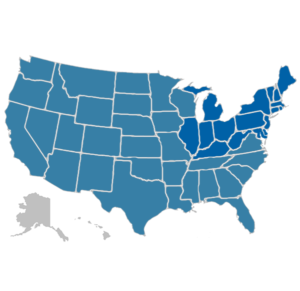House Down Payments: Everything You Need to Know
June 3, 2024
When someone says they’re saving for a house, what they actually mean is that they’re saving for a mortgage down payment. It’s unusual for anyone to show up with the full value of a property in cash, though it may be more common in today’s frantic real-estate market.
A down payment is a significant sum of money that you will put into the purchase of your new home, in which you will make monthly payments on a mortgage loan to pay off the remainder. Before you buy the property outright, it may take twenty or thirty years, or even longer.
For many people, the down payment is the most significant impediment to homeownership. Monthly mortgage payments may be the same as — or even less than — what someone would pay in house rent in the same neighborhood. However, in order to get to that point, a potential homebuyer must first have the required down payment, which may be as much as $30,000 or more in the bank.
Don’t give up! Here’s what you need to hear before making a down payment.
If you can’t afford a 20% down payment, your lender would almost certainly require you to pay Private Mortgage Insurance (PMI). This is because your bank or lender views a loan with less than a 20% down payment as a riskier loan that requires protection in the event you default on your payments.

PMIs range between 0.5 percent and 1% of the mortgage amount (annually) and these fees are included in the monthly mortgage payments. When you have 80 percent equity in your house, you can stop paying PMI.
There are definite benefits to putting down a 20% down payment, but it is by no means needed. The average down payment on a home has been between 5% and 7% in the last five years.
Keep in mind, though, that the type of loan you choose will affect how much you put down (and the length of the loan). A traditional loan, for example, requires a minimum of 3% down payment and is either 15 or 30 years long. A 3.5 percent down payment is needed for an FHA (Federal Housing Administration) loan.
A lower down payment allows you to purchase a house faster and save money for other expenses such as renovations and home improvements.
However, a lower down payment increases the monthly mortgage payments, and you’ll almost certainly need to include private mortgage insurance.
It’s simple: if you borrow less, you’ll have less debt to repay and can pay less in net interest. When the loan-to-value (LTV) ratio is lower, mortgage lenders and banks normally give better interest rates. Before approving you for a home loan, banks use your loan-to-value ratio (expressed as a percentage) to determine how risky you are.
A higher down payment also raises your home equity, which is the value of your home that you haven’t lent against and will use to refinance at a lower interest rate.
Also Read: What Is the Legal Description of Property?
Sure, you’ve been diligently saving for your down payment, but keep in mind that a bank will not grant you a mortgage until you have a certain amount of money in your bank account.
Banks and lenders would want you to be able to make your monthly payments for at least the first two to three months, often known as a cash reserve requirement. You’ll need to show that you have liquid assets in your checking or savings accounts, your bank can also accept money kept in the form of stocks, shares, 401(k)s, and other financial instruments. If your monthly mortgage payment is $2000, your lender would expect you to have at least $4000 on hand.
Bear in mind that you’ll have to make more than just your monthly mortgage payments. There are also closing expenses, such as title insurance, renters insurance, and a home inspection. Your closing costs will vary between 2% and 5% of your purchase price. So, if you purchase a house for $500,000, the closing costs could be between $10,000 and $20,000.
FYI: If you’ve been saving for a down payment but are having trouble making it happen, a down payment assistance program such as an FHA or VA loan might be able to help. These services provide support from government agencies, nonprofits, and labor unions that can be used as loans before you move in, or even as grants that you don’t have to pay back. Homeownership may seem to be out of reach financially, but it may be closer than you think.
Related Articles:






Need help looking for a new home? The prospect of moving into a new house might be very appealing. The process of locating one, from the first search for the ideal neighborhood to the time and work required to obtain a mortgage, may appear daunting. As you begin your search for a new home, keep these househunting guidelines in mind to stay focused, organized, and cheerful.
When it comes to finding a new home, there are some things that aren’t negotiable. At the very least, you’ll need enough bedrooms and bathrooms for your family, a location that allows you to commute to work while also giving decent educational possibilities for your children, and a property that can give all of this without breaking the bank. Failing to stick to a budget might lead to falling in love with a house that is ideal in every way except for the price.
Paying cash for your home – which isn’t always doable – or ensuring that your monthly total mortgage cost, including insurance, homeowners’ association fees, and other expenses, doesn’t exceed 25% of your entire take-home pay.
Make a moving checklist of the things you’ll need in your new house before you start looking at individual postings. You should also keep track of your desires, but keep in mind that not all of them will be fulfilled during your home hunt. These considerations can help you narrow down the homes you’re interested in and keep you on track during the process, in addition to determining the physical areas that fit both schools and work commuting demands as well as your budget. Finding a new home isn’t always straightforward, but following these tips can make it a lot easier.
Also Read: How to Buy Your First Rental Property
You’ll need a mortgage to make a new place to live affordable unless you can afford to buy a property altogether. If you wait until you’ve located a home that ticks all of your boxes before applying for a home loan, you can end up waiting a long time to find out if your bank or other lenders will accept the loan. This can lead to a slew of issues, including the loss of what could be a fantastic home for you and your family.

Pre-approval for a home loan is recommended. This makes knowing your budget, working with real estate brokers, and acting fast and decisively when necessary much easier.
Don’t underestimate the value of a real estate agent unless you have extensive real estate experience or the time, energy, and willingness to manage the entire process yourself. They have access to databases that the general public does not, as well as knowledge of the local market, industry contacts, and other important characteristics. A trustworthy agent can point you in the right direction and help you avoid issues.
A professionally set property is appealing, but you won’t keep the furniture, art, and other objects that make it appear so good once you move in. Consider factors such as the home’s structural stability and condition, as well as how you will feel in the room with your own furnishings. Consider the property without the furnishings to ensure that it is a good fit for you and your family.
You must first locate a new home before thinking about relocating. After you’ve utilized these guidelines to find a location that suits your needs, contact WowMover’s skilled movers and packers to make the transition as easy as possible.
Related Articles:






Considerations When Building A Fence After You Move, If you’re moving to a new home, you may want to repair or replace your fence. What are your responsibilities, laws, and fence etiquette when it comes to your neighborly responsibilities and fence etiquette?
The threshold of the land boundary is the first thing you cross when you relocate to a new property. The invisible line that demarcates what piece of land you own, legally separating it from the property next door and what land is open to the public.
The concept of building your home with a fence is centuries old; you may not need to dig a moat or build a drawbridge, but securing your land with a border fence sends a strong message to the outside world that you should only enter by invitation or “at your own risk.”
Fence etiquette, believe it or not, exists! Even if you plan on erecting a fence around your property within the confines of the law, there are things that aren’t necessarily specified in the law that could irritate your neighbors if you proceed without their consent. You may need to consider influences such as history, aesthetics, environment, corporate neighborhood management, or design, depending on your neighborhood and the tone of where you live.
Finally, if the fence is created within your property’s limit and you meet the requirements, you have the right to build whatever style of fence you like. It all comes down to consultation and being willing to modify your views if someone truly dislikes the plan– else, things could go nasty!
Also Read: What Is the Legal Description of Property?

Some things to think about when it comes to fence etiquette:
There are many different types of fences and materials to choose from to construct the boundary you desire. However, your budget and needs will ultimately determine what you choose. If your property is large, you will require more fencing, materials, and labor to accomplish the project. If you install a simple wire fence instead of a full brick fence with a retaining wall and elaborate Victorian-era style wrought iron gates with a smart open feature and smart home security, for example, you will save money.
Brick, stone, wood, Colorbond steel, corrugated iron, concrete, PVC/vinyl, glass, and wrought iron are all options. Depending on your selected design, your fence can be made of a variety of materials. If you’re like arts and crafts, you can even upcycle old materials. Plan your fence to withstand strong sunlight and heat, mold and mildew, traffic, pollutants, floods, landslides, and other local environmental variables. Do you live in a coastal suburb? There’s a chance you’ll have to deal with salt spray and rust.
Also Read: How To Handle Property Line Issues?
Make sure your fencing contractor is licensed and insured, as substandard construction can lead to a fence’s early demise. The average cost of building a fence is varied greatly based on the requirement and the materials used. It’s usually calculated by the meter, but the rate might take into account a variety of factors to enhance or decrease the installation’s complexity.
Fencing costs can include the following:
To create the foundation of any quotations, your potential contractor should come to the property for a preliminary examination.
If you’ve moved into a home with an existing fence, inspect it for flaws such as unstable posts, weak palings, inadequate foundations, rot, cracking, movement, rust, termites, and so on. If possible, repairing your fence rather than building a new one will save you money in the long run.
The barrier was built with one goal in mind: to keep people safe while keeping them out. The fence was the greatest emblem of riches and power in medieval times. If you fenced your community, you were erecting a barrier against potential enemies and declaring your willingness to battle to defend what you had built. Our fences are the last line of defense against the “outside,” but they are also a powerful barrier against burglary and home invasion.
Related Articles:






Work remotely in these places and get paid since there are cities and towns across the country that are offering hefty incentive packages to entice remote workers like you, ranging from cheap karate classes and low-interest mortgages to relocation help and a year of free cappuccino.
Although hanging out with high-octane martial artists in Iowa may not be your idea of fun, some of the discounts may be too good to pass up.
Before COVID-19, the majority of workers commuted to work.
However, this is changing, as is the view of distant employees as lifeless slackers.
According to some estimates, nearly 5 million Americans work at least part of the time remotely, and that number might treble in the next few years.
If you’re thinking about taking advantage of one of these deals, keep in mind that the most acceptable bonuses usually go to
However, some residents are angry that their tax dollars are being spent on luring “well-heeled” outsiders rather than fixing potholes, establishing bike routes, and improving schools.
Municipal relocation incentives for remote workers are here to stay, no matter where you stand on the topic.
Savannah is hard to top due to its rich history, beautiful seaside environment, and a plethora of activities.
Savannah has traditionally been a regional vacation attraction for beach lovers, foodies, history, art, and culture fans. It is located in northeast Georgia on the Savannah River, across from South Carolina.
Savannah in a nutshell
The Savannah Technology Workforce Incentive was established in the spring of 2020 to attract remote tech professionals who appreciate “geographical freedom” in their careers, whether freelancers or full-time employees.
Incentives:
Indeed, it’s not much, so if you’re thinking about moving to Savannah, you’ll need to plan.
Keep in mind that Savannah has a lot going for it, which may be enough to compensate for the lack of freebies and incentives for some.
Requirements for Eligibility
VALUE OF THE ENTIRE INCENTIVE – $2,000
Stillwater, Oklahoma, is a close-knit community of 50,000 people home to Oklahoma State University. It is located midway between Oklahoma City and Tulsa.
Even though it’s hot in the summer and bitterly cold in the winter, Stillwater has plenty of big-city attractions like museums, botanical gardens, and theaters, as well as a homey small-town feel that you won’t find in LA or New York.
At a look, Stillwater
Like the other cities on this list, Stillwater is looking for remote workers and has put together a competitive package to entice them.
Providing incentives
Requirements for Eligibility
VALUE OF THE ENTIRE INCENTIVE – $7,500
Four historic communities known as The Shoals are nestled along the picturesque banks of the Tennessee River in northwest Alabama.
Tuscumbia, Florence, Muscle Shoals, and Shoals have always been popular among history historians, music fans, and art enthusiasts.
However, these days, they’re popular with those who want to slow down and improve their quality of life while also saving money.
A quick overview of the Shoals
The Remote Shoals program, administered by the Shoals Economic Development Authority, pays up to $10,000 in cash to qualified candidates.
Providing incentives
Of course, as with all good things, there are certain limitations.
Requirements for Eligibility
VALUE OF THE ENTIRE INCENTIVE – $10,000
Wild. Wonderful. West Virginia is a state in the US.
If you’ve ever visited, you’re aware of West Virginia’s natural splendor.
West Virginia’s economy used to be heavily dominated by manufacturing and coal, but it is now evolving with the times.
To that end, several cities and towns, including Morgantown, are stepping up their efforts to lure remote and tech employees who enjoy spending time in nature.
Morgantown in a nutshell
The Ascend West Virginia program, created by West Virginia native and Silicon Valley billionaire Brad Smith and his wife Alys, aims to stimulate innovation, productivity, and an excellent work-life balance without early burnout.
Ascend West Virginia is now accepting applications from anyone interested in relocating to Morgantown, with Lewisburg and Shepherdstown set to join the roster in 2022.
Providing incentives
Payment checks are issued in person at the coworking space, most likely because Ascend West Virginia wants to make sure you’re present.
Requirements for eligibility
VALUE OF THE ENTIRE INCENTIVE – $12,000
Iowa has a lot to offer remote workers eager to sacrifice city life for country pleasure. It is known for its large farms, tiny towns, friendly people, and wide-open areas.
Though Newton is rural, it is only 35 miles east of Des Moines, and the cost of living is substantially lower than in adjacent states like Illinois.
Newton in a nutshell
Newton’s scheme to attract distant employees, known as the Newton Housing Initiative, offers cash and other benefits to in-town house buyers.
The effort, which began in 2014 to increase Newton’s tax base, improve local services, and rev revive the stagnant housing market, has since grown.
Providing incentives
Requirements for eligibility
VALUE OF THE ENTIRE INCENTIVE – $12,500






Leasing positively accompanies a lot of points of interest. For one, tenants don’t need to stress over the creation of essential home enhancements to the property. They likewise aren’t liable for paying costly property charges on the rental. What’s more, tenants have the choice to get and move toward the finish of their rent term. Giving them adequate adaptability with regards to moving. Notwithstanding, leaseholders do should be aware of many commitments and duties when leasing a home. Here are things to check when renting a house.
No one can really tell what will happen when you move into another home. Indeed, even a property in the most secure part of town can encounter surprising disasters. From cataclysmic events, for example, a fire, to break-ins and burglary, these heartbreaking occasions happen very frequently.
The best thing you can do is be set up by putting resources into tenants’ insurance. While a proprietor’s protection or insurance may cover the structure when all is said in done, it likely won’t cover your particular belongings. Rather, you will require the tenant’s insurance to help replace your things on account of water harm, fire, or robbery. You may also require or need it to help with medical expenses in the event that injuries happen while inside the home.
Putting down a security deposit? In the event that you need it back, we suggest recording all previous damage to the home. For confirmation, take photographs and submit them to the proprietor. You may also need to approach your landowner for a move-in/move-out agenda or checklist.
This rundown incorporates explicit highlights that the proprietor will look at when you leave. so as to evaluate the harm done to the property. It’s significant in light of the fact that it teaches the proprietor to imagine a scenario where (anything) was harmed while the tenants lived in the home. It likewise protects the tenants from having to pay for damages that were at that point present.
Certainly, rentals are definitely not a lasting circumstance or permanent situation. Yet, would you truly like to stall out in a terrible part of town? In any event, for a couple of months? Before focusing on a rental, try to thoroughly explore the area to guarantee that it’s a sheltered, secure, and advantageous spot to live in.
Other than crime percentages, we suggest investigating neighborhood amenities. For example, cafés, supermarkets, corner stores, open transportation alternatives, vehicle parking rules, convenience stores, and recreation centers. Do these alternatives fit your needs? Are conveniences and amenities found close by? To get familiar with a territory
Also Read: Best Guides To Start Your Moving Process
The exact opposite thing you need to do is pay your lease late or neglect to pay it at all. In the event that your landowner acknowledges installment by means of online bank transfers. we suggest setting up automated. month to month charge installments to the proprietor.
Along these lines, you’ll always remember to pay your lease and service bills. It will likewise give you one less thing to stress over during the month. On the off chance that your proprietor doesn’t accept installments online, and favors cash sent as it was done in the good ‘ole days (through the mail), basically set updates on your schedule every month.
Did the latrine or toilet out of nowhere quit working? Is the heater making a bizarre commotion? Whatever it is, don’t hold up until it’s past the point where it is possible to have something fixed. On the off chance that a thing breaks or gets harmed inside the home, contact your landowner as quickly as time permits.
For the most part, it’s the landowner’s obligation to pay for these fixes – however, you may need to find and plan a schedule for a repairman to go to the property. Try to tell your landowner after it is fixed.
While moving into a rental, we highly suggest a deep cleaning in the property. Do this at the earliest reference point of your remain. All things considered, no one can tell who was living in the home before you moved in. Truth be told, you don’t have the foggiest idea about the last time it was cleaned thoroughly.
So break out that vacuum, dust off those window ledges, and prepare your cleaning supplies. Beginning on week one, living in a sterile and completely cleaned property ought to be the first concern.

While you absolutely don’t need to be the closest companions to your landowner, you should, in any event, expect to have a common and deferential relationship. Not only will this energize correspondence about issues with the property, but it will likewise make the landowner all the more ready to work with you later on.
Can’t stand the paint shading on the room divider? Prior to doing anything exceptional, you should converse with the landowner about any customizations you need to make to the property. Truth be told, if the customizations are an unquestionable requirement for you, we recommend talking about this preceding signing the rent
. Numerous proprietors are entirely fine with renters painting the dividers, as long as the occupants pay to have them repainted after they move out. Maybe your proprietor is in any event, ready to part the expense of these restorative changes so as to improve the property. Whatever the case, occupants ought to consistently get the proprietor’s approval recorded as a hard copy or in a written format before making changes to a rental.
Prior to signing a lease, ensure you really read it first. It is anything but an ill-conceived notion to also have a Realtor and, additionally, a lawyer investigates it to ensure everything is genuinely standard. Certain rules and clauses to look at including pet ownership policies (if appropriate), maintenance, when and how to pay your lease, and rules for breaking a lease.

You should likewise read all rules with respect to getting a security deposit back and renting the home (in the event that you intend to leave for part of the year). The exact opposite thing you need is sudden astonishments from a landowner, so make a point to get your work done before signing an official rent.
So you found the perfect investment property, sign a rent, and are prepared to move. To help make your up-and-coming move simpler, we recommend employing experts to deal with the hard work.





Whether you’re a first-time purchaser or a seasoned homeowner looking to upgrade, saving for a mortgage is a regular habit. But how much cash do you require at the closing?
It is feasible to purchase a home without putting any money down. Continue reading to learn about various zero-down-payment and low-down-payment house buying choices for when you’re ready to buy a home.
When you buy a house with no money down, you’re taking out a 100% funded mortgage loan. You should be aware of various government-sponsored programs in the United States that require no down payment.
If you’re a first-time or repeat home buyer, you might be eligible for these alternatives. You might be astonished to learn that, despite the state of the economy, you may be qualified to pay nothing at closing.
If you want to buy a home with no money down, you have two options: a U.S. Department of Agriculture (USDA) loan or a U.S. Veterans Administration (VA) loan.
Home Loan from the Veterans Administration (VA Loan): If you are a member of the United States military with at least 90 days left on active service or a veteran who has served for at least two years, you are eligible for a VA home loan with no money down. This is the simplest zero-down-payment house loan to obtain, and it’s worth looking into if you qualify.
USDA Home Loan: If your credit history is a concern, a USDA home loan may be the best option for you. This zero-down home financing option has been operating since 1949 and offers flexible credit standards. Previously known as the Section 502 mortgage, the USDA loan is also known as the Rural Housing Loan.
This USDA-sponsored rural development loan promotes people who live in rural regions to become homeowners so that they can contribute to the development of their communities. And you don’t need much to meet the requirements. You only need enough money to cover your monthly mortgage payment, but you can’t be too affluent. Your income must fall under the USDA’s guidelines.
You can get these benefits in addition to buying a house with no money down if you apply for a USDA loan with no money down:

Purchasing a home with no money down might be challenging at times. Here are some advantages and disadvantages of USDA, VA, and FHA home loans. These two organizations set standards for conventional loans that are not guaranteed or insured by the government.
VA Home Loan
Pros:
Cons:
USDA Home Loan
Pros:
Cons:
FHA Home Loan
Pros:
Cons:
Fortunately, paying 20% down on a home loan appears to be a thing of the past. Home prices have risen throughout time, making it simpler to buy a home without needing to put down a large down payment. If you can’t buy a house with no money down for some reason, there are other low-cost possibilities.
Federal Housing Administration (FHA) Loans: FHA home loans backed by the federal government are insured by the Federal Housing Administration. This sort of house loan is appealing to first-time homeowners since it requires only a 3.5 percent down payment.
A low-cost FHA house loan does not require a perfect credit score, unlike the no-money-down USDA and VA home loans. Other advantages of FHA mortgages include:
If you’ve had a bankruptcy, short sale, or foreclosure, an FHA home loan can help you make the most of your next home buying chance.
Learn more: How Your Credit Score Impact Mortgage Rates
Home Loans in a Traditional Setting: Fannie Mae and Freddie Mac were established by the United States Congress in 1938 and 1970, respectively, to offer borrowers with accessible cash and fair repayment terms, as well as liquidity to banks, to make the home financing process easier.
When purchasing a property with a conventional home loan, you can make a 3% down payment at closing if you’re a first-time homebuyer. Private mortgage insurance, or PMI, is often required with this loan.
Some think it’s a seller’s market right now. The cost of living is increasing. There is a lot of demand, but there isn’t a lot of inventory. The silver lining is that mortgage rates and monthly property ownership costs are still reasonably cheap.
If you are in the following situations, taking advantage of these no-money-down home loans or putting a low down payment on a property is perfect for you:
How much you pay or are prepared to pay on a mortgage loan is determined by your home-buying demands. Keep in mind that you have choices to Buy a House With No Money Down.
Related Articles:






A house survey is an examination of a property’s condition that might alert a potential buyer to potential problems. A surveyor will come to the residence and provide a report on the problems. What should you watch out for during a survey? We spoke with industry professionals and developed a list of the top four considerations when purchasing a home.
The condition of the room is one of the top four concerns for a buyer. While tiles may be replaced, other issues such as roof leaks can be costly to resolve. Remember to inspect downpipes and gutters as well.
Insulation is a typical survey concern, but it can be quite important to a potential buyer. Better insulation saves money on electricity and makes rooms warmer. Fortunately, the insulation material is inexpensive, and placing it on walls will take little time. Consider an insulated floor instead, which will take longer to install but will save you money in the long run.
Although structural vibrations can appear to be quite threatening, they rarely endanger the house’s stability. However, if the surveyor discovers cracks larger than 10 millimeters, this could signal a potentially dangerous issue. A thorough study will be required to determine the source of the cracks and ensure that the house’s structure is secure.
Humidity is a prevalent problem during a house survey, particularly in older homes and antique houses. This is a simple problem to solve, especially when dealing with small surfaces. If the damp area is larger, the job may be more costly, especially if it requires the replacement of complete walls. Furthermore, determining the reason and devising a long-term cure will be critical.

Related Articles:






Purchasing a new home that is far away from your current one is a major life decision because it entails a significant financial investment. Having a new home where you can make new friends and start over is also an exciting and adventurous experience. Buying a new home far away from your current location, on the other hand, can be a rather stressful endeavor. It is associated with a great deal of mental and emotional strain. From deciding on the best place to relocate to, to finding the right realtor, buying within your budget, and finally planning your relocation, we’ve got you covered.
Here are a few pointers to help you with your home search.
When buying a new house, you must know how much money you have set aside for the purchase and relocation. You must be able to calculate the true cost of the house as well as the costs that would be incurred. Figure out how much it would cost to buy a new home, hire a real estate agent, hire a relocation specialist to help you move out, homeowner’s insurance, property taxes and utilities, house repairs, transportation, food, and other costs.
If possible, you will need to consider a mortgage loan from a bank or another mortgage institution willing to lend you the money you need to buy the house. However, working within your budget is recommended to stop accumulating debts that could lead to the loss of your home in the long run. If you don’t have the money right away, you might pay in installments. The first step in buying a new home should be to create a budget.
Also Read: Things You Should Know About Your House Down Payment
Before purchasing a home, you can pay a visit to the property to inspect it thoroughly. Even with the aid of a good realtor and a virtual tour, a visit to the house and inspection are needed. It’s typically a good idea to get a sense of how your life will be after you’ve moved into your new home. You can also hire a specialist to inspect the property. A good inspector will look over the whole house and give you professional advice about whether you can buy it or not. This will save you from making the wrong decision and having to live in a house that isn’t your dream home.
Also Read: Hidden Expenses When Purchasing A Home
One of the most important things to do when relocating and purchasing a new home is to find a decent and trustworthy realtor. You should be able to choose a realtor with whom you are comfortable working. Find a realtor with sufficient experience. Someone who is familiar with the housing market and the area in which you will be relocating. You should be able to reach out to the realtor at any time to speak with them.

Often ask for recommendations from other homeowners when choosing a realtor. A referral is valuable because it ensures that you are dealing with the right people. If you don’t know someone in the new area who can recommend a realtor, look for an online forum for that area and connect with people there. You may also study the realtor online or via a real estate firm to see if they are reliable and trustworthy.
As a result of the pandemic, consumers are turning to the internet to find a new home. They can conveniently go to a real estate website with a virtual house search and find an up-to-date listing of houses in the area they want. They can even take a virtual tour of the house they want to buy. This is advantageous because you would not have to drive to inspect the property. If you have a busy schedule, a virtual tour can be beneficial.
Your new house should be large enough to fit your whole family. However, keep in mind that you must always work within your budget. If you are single, a one-bedroom apartment is an option. You can get a two-bedroom apartment if you are newly married. You can also get an apartment that can fit both you and your guests if you are a couple who does not want to have children.
When you have a cat, you should think about a pet home, the school your children will attend, and accessibility features for an elderly person if you have one living with you, as well as other family members. If you are not working remotely, remember the distance between your home and your workplace. And if you work from home, you’ll need a home that can serve as both an office and a home.
Knowing your current city or location will go a long way toward assisting you in making the best decision when relocating to your new home. Visiting the new city and getting to know the area. It is important to relocate to a secure area. Check to see if the area is notorious for illegal activity or any other undesirable behaviors. Also, see if you’ll feel at ease in your new surroundings. It’s best to think about how people can communicate in the new place.
Some cities have a reputation for being people-friendly, laid-back, aggressive, and so on. You must be aware of the environment that best suits your way of life. You can also learn about the transit options available in the new city so that you can prepare your budget accordingly when you relocate. Consider other options, such as hotels, grocery stores, and art galleries.
Also Read: Tips on How to Find The Right Neighborhood
Finally, keep an open mind when making your decision. Flexibility is crucial. Although you may have a general understanding of the type of home and community you want to live in, you may find that there are other choices.
Are you considering relocating to another state? Wowmover will assist you in securely transporting yourself and your belongings to your new location. If you want a free quote for your long-distance move,
Related Articles:






Living near the ocean is a dream come true for many people. They want to go to the beach on the spur of the moment. Perhaps they see themselves doing yoga at daybreak while listening to the waves crashing nearby, or roasting marshmallows over an open fire after dark. Who wouldn’t want to live like that?
However, there are certain disadvantages to living on the shore. Before making the move, consider the following factors: traffic, crowds, and sand everywhere. In the end, you’ll have to assess the benefits and draw your own conclusions about living near the ocean. Here are some things to think about when deciding whether or not to relocate to a seaside town. There are compelling reasons to relocate to a coastal town.
Being close to the ocean is enough of a reason to relocate. Sunny days, the soothing sound of the waves and a climate that encourages healthy living are all compelling reasons to relocate to a seaside town. However, they aren’t the only benefits of relocating to a coastal city.
Doctors have recommended going to the beach for anything from anxiety and sadness to obesity for generations. The beach’s health benefits are still valid today. While salt air can help with asthma and other breathing problems and sand can be used to wipe away dead skin cells. The sun also aids in the creation of Vitamin D, which can help to prevent cancer.
Beach towns also tend to eat more heart-healthy seafood, and a walk to the beach can get your heart rate up. Not to mention that simply listening to the waves roll in and out might help you relax and boost your mood.
At the beach, there’s always something to do. You may be able to surf, kayak, swim, stand up paddleboard, or jog along the water’s edge depending on where you relocate. Boardwalks or piers featuring carnival rides and games, casual and fine dining restaurants, and attractions such as aquariums can be found in some beach communities. Others host art festivals and sporting events like fishing tournaments and surfing contests.
There’s always something to do at the beach on any given weekend, especially during the summer, and the majority of the activities are family and pet-friendly.

Expect visitors when you relocate to a seaside town. There will be a lot of people, or at least a lot more than you’re used to. Your brother, who previously couldn’t find the time to visit you, may now be able to do so now that you live near the ocean. You may even enjoy guests at first, but this can quickly become tiresome. Be honest with yourself about how many and how often you want visits. It’s a benefit if you enjoy entertaining; if not, you’ll have to grow extremely excellent at setting boundaries.
Also Read: Moving to a New City or Town? Here Are The 4 Important Things to Consider
The beach, of course, is at the top of the list of reasons to relocate to a coastal town. If you don’t like the beach, why would you want to move there? If you make the move, you’ll be able to walk, pedal, or drive to the beach in minutes, depending on where you buy or rent. And, unlike on vacation, you can devote yourself to a new passion such as surfing, beach volleyball, fishing, or sailing rather than merely dabbling in it.
Do you adore animals? Beaches frequently have a plethora of fauna. Birds soar above and fledge in the surrounding wetlands. Seals may be seen on rocks near the shore, or dolphins may be seen playing in the distance. Additionally, certain beaches and tidal pools with starfish have colorful shells that can be found on hikes.
A move to a seaside community is appealing not only because of the sunshine but also because of all you’ll be leaving behind. You can put away your snow shovel, thick gloves, and parka because the coasts have milder weather. At the beach, you won’t need them. And whether you’re used to high winter heating expenditures or summer A/C bills, they’re no longer an issue. You can count on Mother Nature to keep your home comfortable all year.
Related Articles:






Change is the only thing that is constant. It’s the same with your living condition. There are many reasons to move out of an apartment, but how do you know when it’s time to do so? Although few people enjoy change, it is sometimes vital to adapt to your present living condition. While the work required in moving from an apartment can be overwhelming, it will undoubtedly pay off in the long run.
When it comes to deciding whether or not to upgrade from an apartment, these are some of the best indicators.
When it comes to moving from an apartment, this seems like the most obvious reason to do so. What was once a comfortable bachelor apartment that served you well after graduation is no longer so. It’s impossible to entertain friends or relatives, let alone have someone stay the night. If this describes your situation, it may be time to upgrade.
You’re thinking about getting married or starting a family. Small apartments may work for a single person, but when you add another person to the mix, they can become problematic. Whether you need additional closet space, more kitchen counter space, or want to add a baby room, it may be time to consider moving.
One of the things that influences your decision to relocate from an apartment is your income and pricing. What was formerly affordable for your post-college salary level may no longer meet your demands. If you’ve gotten a raise at work or come into some extra cash, it could be time to start planning your move from an apartment.
Another reason an apartment might have worked in the past was that it was convenient, making your trip to work and home in the evening simple. Nowadays, people are more likely to change employment. Perhaps your flat no longer provides the convenience of a short commute as your workplace changes. If that’s the case, it might be time to start thinking about moving out of your apartment.

One of the things to think about while thinking about moving from an apartment is the area. Your daily existence is influenced by your surroundings just as much as you live in your apartment. As a result, the acts of others may have an impact on you. Perhaps it’s time to explore a move from an apartment, whether you need a change of scenery or your neighborhood isn’t as safe as it was when you first moved in.
Related Topics:
A change in lifestyle, such as starting a family or taking up a new pastime, can have an impact on this variable. Your requirements will alter as your life progresses. If you’re planning on having children, for example, you should start looking at local schools. If you just joined a group that meets on a regular basis on the other side of town and it no longer makes sense to commute, it may be time to consider a move from an apartment.
It’s a significant life decision to upgrade your flat. It may necessitate not just some effort and time, but also some money. If you’re thinking of moving from an apartment, make sure it makes sense. Take your time to consider your options to ensure that you are making the best decision possible.
If you’ve made the right decision and need assistance, give WowMover a call. Apartments can present a unique set of issues, so it’s probably best to leave it to the professionals. We’ve spent years assisting individuals with moving into and out of flats, and we’d be delighted to assist you with your relocation. WowMover is a moving company that specializes in local, cross-country, and international moves. This implies that WowMover can provide a high quality of service no matter where you are going.
Related Articles:





